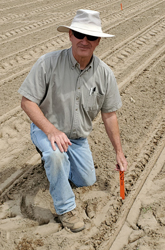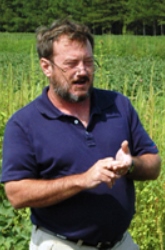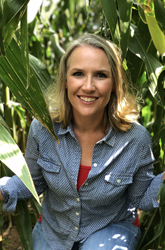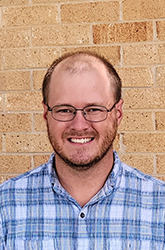 Steve M. Brown is a 1978 graduate in agronomy and soils from Auburn University and later earned MS and PhD degrees in agronomy/weed science at Auburn and Texas A&M, respectively. He worked as an assistant county agent in a cotton pest management role for a couple of years in northern Alabama and then served as a research associate in a Cotton Incorporated-funded project on no-till cotton from 1980 to 1984. From 1987 until 2008, he served as an Extension weed scientist and cotton agronomist for the University of Georgia in Tifton. He worked for a major seed and biotechnology company from 2008 until 2019, when he joined the faculty at Auburn. His entire career has focused on cotton.
Steve M. Brown is a 1978 graduate in agronomy and soils from Auburn University and later earned MS and PhD degrees in agronomy/weed science at Auburn and Texas A&M, respectively. He worked as an assistant county agent in a cotton pest management role for a couple of years in northern Alabama and then served as a research associate in a Cotton Incorporated-funded project on no-till cotton from 1980 to 1984. From 1987 until 2008, he served as an Extension weed scientist and cotton agronomist for the University of Georgia in Tifton. He worked for a major seed and biotechnology company from 2008 until 2019, when he joined the faculty at Auburn. His entire career has focused on cotton.

Keith Edmisten is a Professor and Extension Cotton Specialist with North Carolina State University. He received his BS in Agronomy from North Carolina State in 1981 He received his MS in Crop Science in 1985 from the same institution. He received his PhD in Agronomy in 1987 from Virginia Tech. Dr. Edmisten grew up on a farm in Iredell County, North Carolina.
Keith Edmisten is a Professor and Extension Cotton Specialist with North Carolina State University. He received his BS in Agronomy from North Carolina State in 1981 He received his MS in Crop Science in 1985 from the same institution. He received his PhD in Agronomy in 1987 from Virginia Tech. Dr. Edmisten grew up on a farm in Iredell County, North Carolina.
 Tyson Raper is the Pettigrew Cotton Specialist for the University of Tennessee, with a 75% Extension and 25% research appointment in the Department of Plant Sciences. Dr. Raper is stationed at the West Tennessee Research and Education Center and leads the cotton and small grains programs. His research and Extension program is focused on variety testing, fertility, and a variety of precision ag projects. Additionally, Dr. Raper manages the University of Tennessee Cotton MicroGin. Dr. Raper received his BS from Auburn University, his MS from Mississippi State University, and his PhD from the University of Arkansas.
Tyson Raper is the Pettigrew Cotton Specialist for the University of Tennessee, with a 75% Extension and 25% research appointment in the Department of Plant Sciences. Dr. Raper is stationed at the West Tennessee Research and Education Center and leads the cotton and small grains programs. His research and Extension program is focused on variety testing, fertility, and a variety of precision ag projects. Additionally, Dr. Raper manages the University of Tennessee Cotton MicroGin. Dr. Raper received his BS from Auburn University, his MS from Mississippi State University, and his PhD from the University of Arkansas.

Jourdan Bell is the regional agronomist for Texas A&M AgriLife Research and Extension at Amarillo. She received her PhD in soil science from Texas A&M University and her BS and MS degrees from WTAMU in Canyon in agriculture and plant, soil, and environmental science. Prior to joining Texas A&M AgriLife in 2014, Bell worked as a research technician for the USDA-ARS at Bushland for 14 years in the Soil and Water Management Unit. With USDA-ARS, she assisted in research on manure management, soil water dynamics in dryland cropping systems, and irrigation scheduling. Her current research and extension programs evaluate and promote agronomic practices to enhance crop production and profitability under limited irrigation and dryland systems of the Texas High Plains. She is a current member of the American Society of Agronomy, the Crop Science Society, and the Soil Science Society of America. She previously served as the vice leader (2014) and leader (2015) of the American Society of Agronomy Crop Irrigation Strategies and Management Community.
Jourdan Bell is the regional agronomist for Texas A&M AgriLife Research and Extension at Amarillo. She received her PhD in soil science from Texas A&M University and her BS and MS degrees from WTAMU in Canyon in agriculture and plant, soil, and environmental science. Prior to joining Texas A&M AgriLife in 2014, Bell worked as a research technician for the USDA-ARS at Bushland for 14 years in the Soil and Water Management Unit. With USDA-ARS, she assisted in research on manure management, soil water dynamics in dryland cropping systems, and irrigation scheduling. Her current research and extension programs evaluate and promote agronomic practices to enhance crop production and profitability under limited irrigation and dryland systems of the Texas High Plains. She is a current member of the American Society of Agronomy, the Crop Science Society, and the Soil Science Society of America. She previously served as the vice leader (2014) and leader (2015) of the American Society of Agronomy Crop Irrigation Strategies and Management Community.

Reagan Noland is an assistant professor and Extension agronomist at the Texas A&M AgriLife Research and Extension Center in San Angelo. He coordinates an applied research and Extension program in collaboration with county Extension agents, other specialists, and industry professionals to support crop producers across west central Texas. Important crops in this region are primarily cotton and wheat but also include forage crops, cover crops, and other grain and oilseed crops. Specific research and programming efforts are focused on variety selection, irrigation scheduling, weed management, reniform nematode management, cotton root rot, and fertility. Reagan completed his academic training at Angelo State University (BS), Texas A&M University (MS), and the University of Minnesota (PhD), and he served as the grain crops Extension agronomist for the University of Georgia at Tifton prior to beginning his role in Texas in 2018.
Reagan Noland is an assistant professor and Extension agronomist at the Texas A&M AgriLife Research and Extension Center in San Angelo. He coordinates an applied research and Extension program in collaboration with county Extension agents, other specialists, and industry professionals to support crop producers across west central Texas. Important crops in this region are primarily cotton and wheat but also include forage crops, cover crops, and other grain and oilseed crops. Specific research and programming efforts are focused on variety selection, irrigation scheduling, weed management, reniform nematode management, cotton root rot, and fertility. Reagan completed his academic training at Angelo State University (BS), Texas A&M University (MS), and the University of Minnesota (PhD), and he served as the grain crops Extension agronomist for the University of Georgia at Tifton prior to beginning his role in Texas in 2018.
